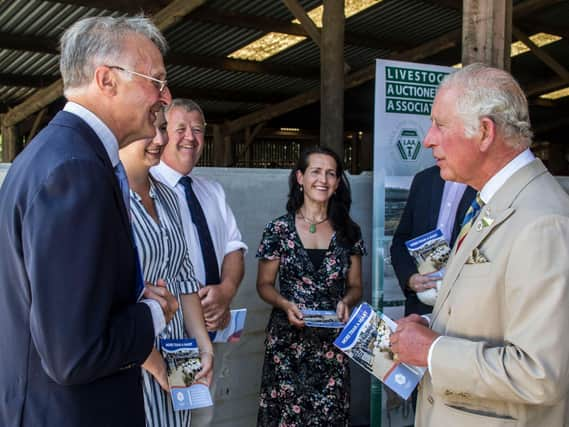New report launched by Prince Charles shows how auction marts are helping to tackle social isolation among farmers


Commissioned by The Princes’s Countryside Fund, More Than a Mart highlights the number of different ways markets add value to their local communities.
Researched by Dr Caroline Nye, Professor Matt Lobley and Professor Michael Winter from the University of Exeter, the report shows that although there is no “blanket” model of a livestock auction mart which determines their success, they are “far more than just a place to buy and sell livestock”, running health surgeries, carol services and providing venues for training.
Advertisement
Hide AdAdvertisement
Hide AdThe report has been welcomed by Chris Dodds, executive secretary of the Livestock Auctioneers Association (LLA), who said it highlights how livestock markets continue to be at the heart of the rural community.
“The marts not only play an integral part in the red meat supply chain in providing the much-valued independent, transparent, open and competitive forum used to determine the true market value of livestock, but also through providing a myriad of alternative services and support for the local farming community.
“The Prince’s Countryside Fund report findings and recommendations will assist auctioneering businesses throughout the UK to prepare and equip for the many changes we all face.”
Mr Dodds added that the LAA looked forward to working with members throughout the development and delivery of this work.
Advertisement
Hide AdAdvertisement
Hide AdThe authors of the report said one farm support network based at a mart told them that it “saves lives”.
Their research showed that as many as one in five mart visitors went for social reasons alone, and that marts offered solutions to the issue of poor mental health within the industry – from rural chaplains based at the marts, to auction mart managers who are seen as a trusted source of knowledge and farmer networks who attend sale days.
The report also urged livestock farmers to “engage” with support services and social activities at their mart, and take advantage of events, training, and other support offered there.
Dr Caroline Nye, Research Fellow at the Centre for Rural Policy Research, University of Exeter, and lead author of the report, said: “The livestock auction mart is one of the few places left where members of the agricultural community can congregate together on a regular basis and share their experiences.
Advertisement
Hide AdAdvertisement
Hide Ad“As farmers become more isolated from each other – as well as from their customer – the importance of these spaces has become so much greater than that of their original purpose.
“They are key hubs from which members of the agricultural community can be supported to become more resilient both in terms of business and of health, and they should be recognised, utilised and supported as such.”
The research also noted the increase in female farmers using the marts. Approximately 17 per cent of UK farmers are women, an increase of 7 per cent in a decade.
One female respondent said: “For myself, the mart has been a huge boost. It has given me so much more confidence to do things and I do feel that I can talk to people, and sometimes it’s easier to talk to people outside the family.”